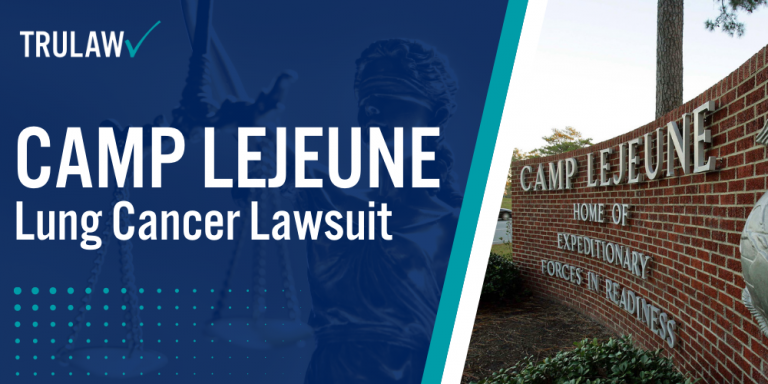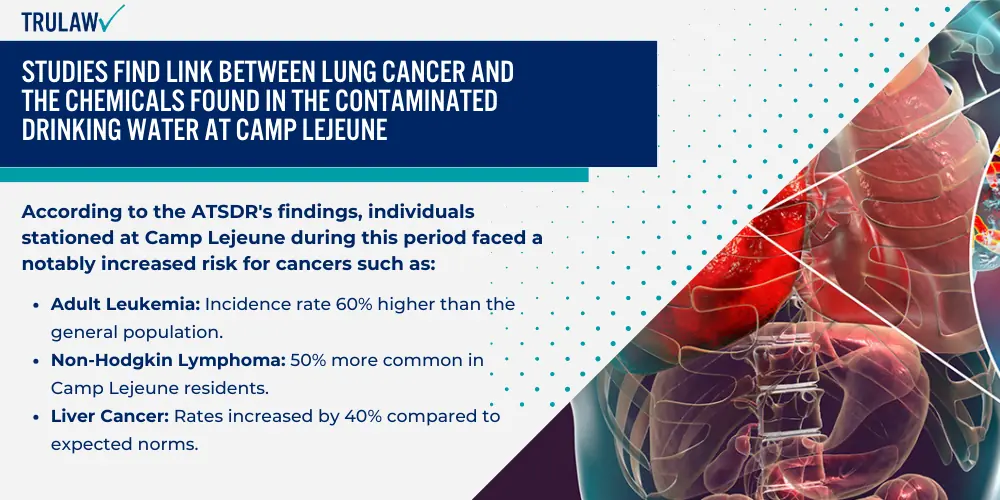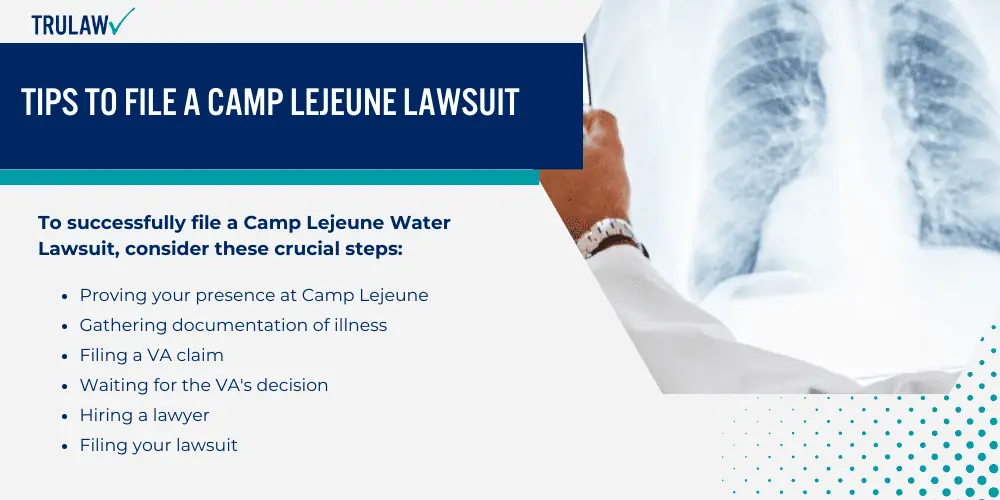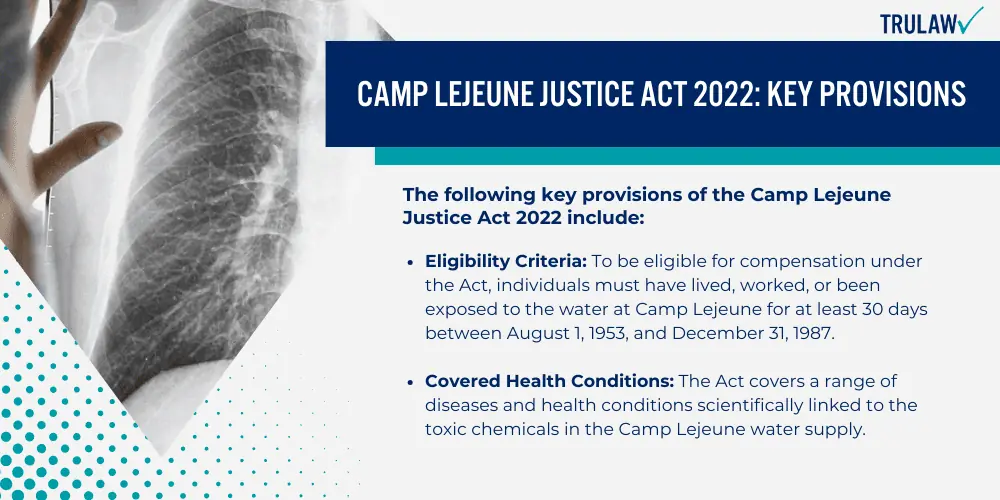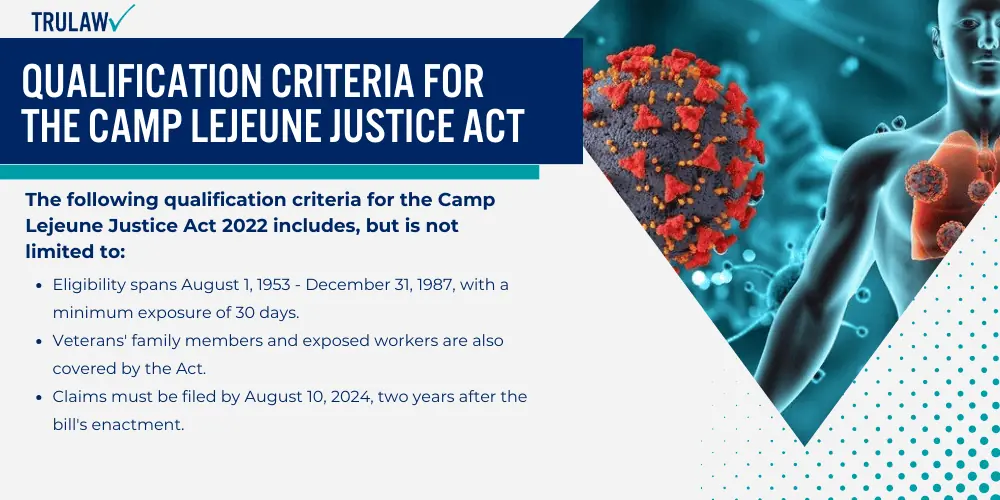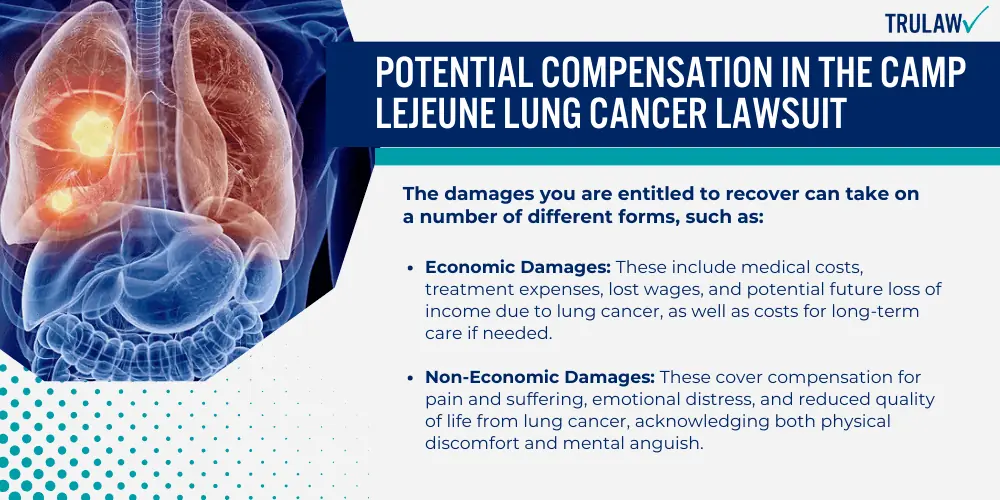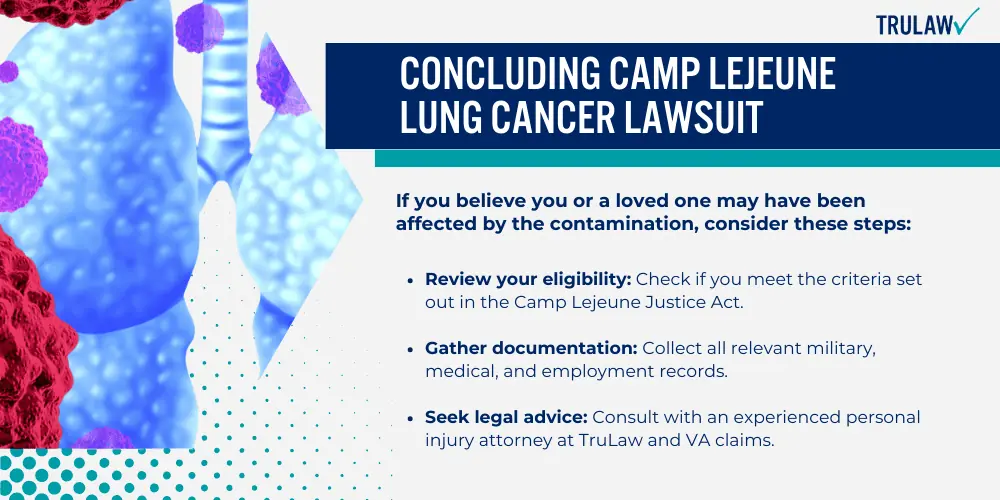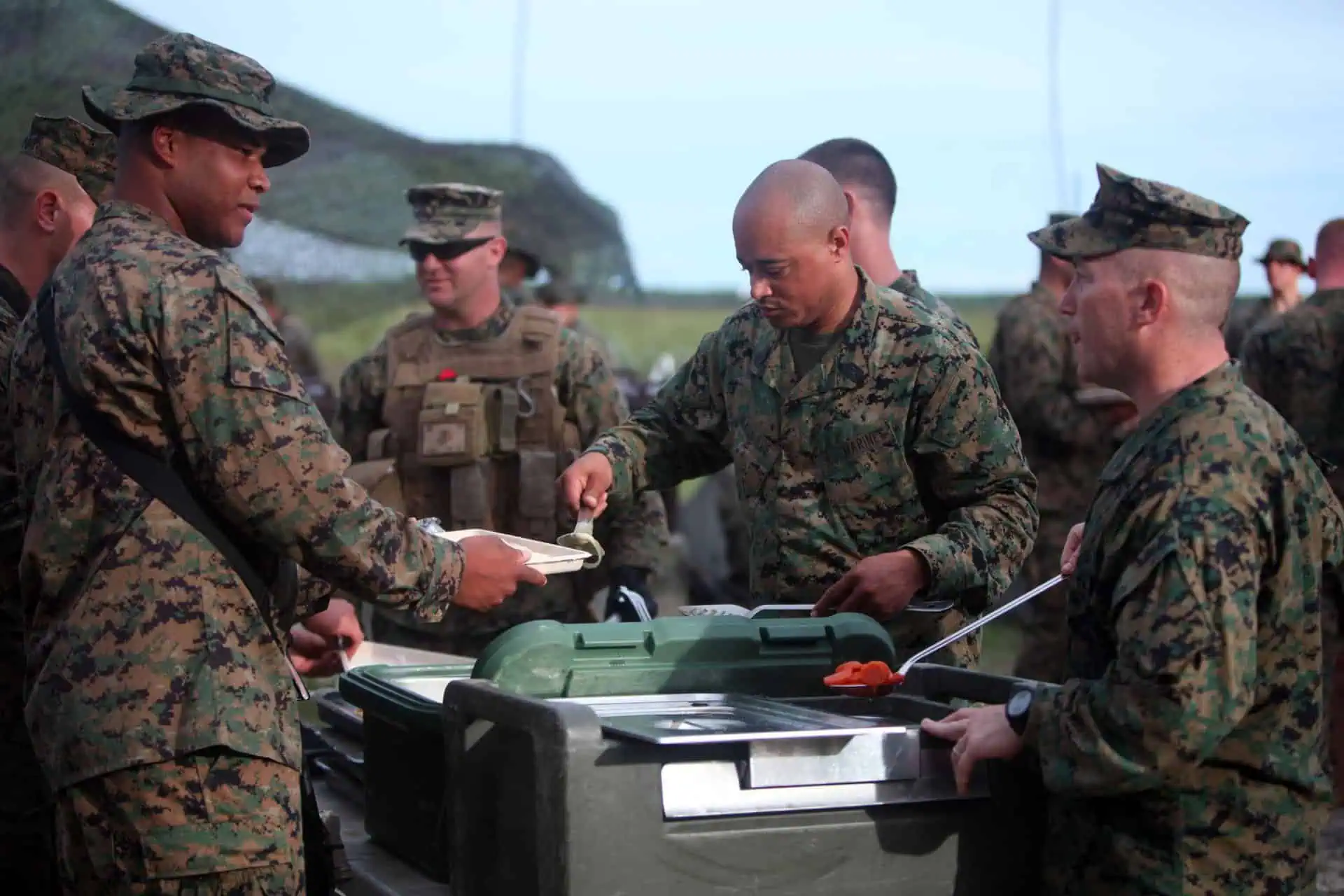Exposure to Chlorinated Solvents and Lung Cancer: Results of the ICARE Study published in Occupational and Environmental Medicine in October 2014, explored the relationship between chlorinated solvent exposure and lung cancer risk.
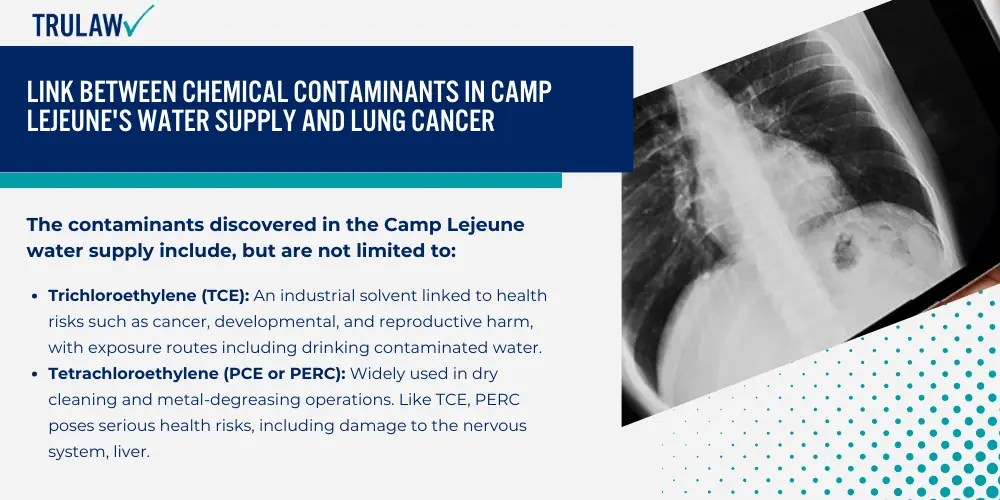
This population-based case-control study collected work histories from 2,926 cases and 3,555 controls to assess occupational exposures with job-exposure matrices.
The findings revealed a significant association between lung cancer and exposure to a mix of Perchloroethylene (PCE), Trichloroethylene, and Dichloromethane(DCM), particularly after adjusting for asbestos exposure and socioeconomic status.
This suggests Perchloroethylene (PCE) as a potential lung cancer risk factor — especially in women who had a higher prevalence of exposure.
The water supply in Camp Lejeune, used between 1953 and 1987, was contaminated with volatile organic compounds (VOCs) that have been scientifically linked to the development of lung cancer.
The contaminants discovered in the Camp Lejeune water supply include, but are not limited to:
- Trichloroethylene (TCE): An industrial solvent linked to health risks such as cancer, developmental, and reproductive harm, with exposure routes including drinking contaminated water, inhalation, or skin contact.
- Tetrachloroethylene (PCE or PERC): Widely used in dry cleaning and metal-degreasing operations. Like TCE, PERC poses serious health risks, including damage to the nervous system, liver, kidneys, and it is also classified as a likely carcinogen.
- Vinyl Chloride (VC): A gas used primarily to make PVC, a type of plastic. Exposure to VC, even at low levels, has been associated with an increased risk of a rare form of liver cancer, as well as damage to the lungs, brain, and blood vessels.
- Benzene: A colorless or light yellow liquid used in the manufacture of plastics, resins, synthetic fibers, rubber lubricants, dyes, detergents, drugs, and pesticides. It is known to cause cancer, particularly leukemia, and can affect the bone marrow and blood production.
Contact TruLaw today by using the chat on this page to find out if you qualify to file a Camp Lejeune Lung Cancer Lawsuit according to the most recent links discovered between the contaminated water at Camp Lejeune and lung cancer.
We offer a free, no-obligation consultation to discuss the details of your case and your potential legal options.
1. Trichloroethylene (TCE)
Trichloroethylene, commonly referred to as TCE, is one of several volatile organic compounds that were found contaminating the water supply at the military base Camp Lejeune and has been a subject of extensive research.
Studies demonstrate that this substance can be carcinogenic when humans are exposed to it over long periods.
The effects of long-term exposure to Trichloroethylene include, but are not limited to:
- Increased risk of certain types of cancer, such as kidney, liver, and non-Hodgkin’s lymphoma.
- Potential damage to the nervous system, which can lead to symptoms like headaches, dizziness, and numbness.
- Respiratory problems, including difficulty breathing and potential harm to lung function.
- Negative impacts on the reproductive system, possibly resulting in infertility or developmental issues in unborn children.
- Liver damage, which may manifest as jaundice or other related health conditions.
It is important for individuals who may have been exposed to TCE to seek medical attention and undergo regular health screenings.
Early detection of any health issues can improve treatment options and outcomes.
2. Tetrachloroethylene (PCE or PERC)
Tetrachloroethylene, also known as PCE or PERC, is another volatile organic compound that shares similarities with TCE in terms of its use and the health risks it poses.
It’s commonly used in dry cleaning and as a degreasing agent in various industries.
Health concerns associated with Tetrachloroethylene include:
- Potential to cause cancer, particularly bladder cancer and non-Hodgkin’s lymphoma.
- Negative effects on the central nervous system, which may result in symptoms such as dizziness, headaches, and coordination issues.
- Liver damage, as evidenced by increased liver enzymes and potential for chronic conditions.
- Respiratory issues, including shortness of breath and irritation of the upper respiratory tract.
- Reproductive risks, including possible links to miscarriage and reproductive system damage.
Like with TCE, it’s crucial for anyone who suspects they’ve been exposed to PCE to get medical advice.
Regular check-ups can catch health problems early, leading to better chances for successful treatment.
Both TCE and PCE are now heavily regulated due to their harmful effects, and efforts are ongoing to clean up contaminated sites and prevent further exposure to these dangerous chemicals.
3. Vinyl Chloride (VC)
Vinyl chloride is a man-made substance primarily used to make polyvinyl chloride (PVC) plastic and vinyl products, which include pipes, wire coatings, and packaging materials.
Exposure to vinyl chloride can occur in the workplace or through the release of the chemical into the environment.
Health risks associated with exposure to vinyl chloride are significant and include:
- A higher chance of developing liver cancer, including a rare form known as hepatic angiosarcoma.
- Damage to the liver that may not be immediately apparent but can progress to liver cirrhosis.
- Neurological effects, such as numbness, tingling of the hands and feet, and difficulty concentrating.
- Respiratory problems, with symptoms like shortness of breath and chest tightness.
- An increased risk of developing Raynaud’s phenomenon, where fingers and toes change color and feel numb in response to cold temperatures or stress.
If you’re concerned about potential exposure to vinyl chloride, it’s essential to seek medical guidance and undergo health screenings.
Protective measures and regulations are in place to limit exposure and protect individuals from the harmful effects of this chemical.
Staying informed about these substances and their impact on health is crucial for prevention and early intervention.
Always use protective equipment when handling chemicals and report any suspected exposure to a healthcare professional promptly.
4. Benzene
Benzene is a well-known industrial chemical found in crude oil and is used in the production of plastics, resins, synthetic fibers, rubber lubricants, dyes, detergents, drugs, and pesticides.
It’s also present in cigarette smoke and can be released by burning coal and oil.
Exposure to benzene can lead to serious health effects, such as:
- An increased risk of developing leukemia, particularly acute myeloid leukemia (AML).
- Bone marrow damage, which can result in a decrease in red blood cells, leading to anemia.
- Immune system suppression, making it harder for the body to fight off infections.
- Potential impact on fertility, with studies suggesting it may affect both male and female reproductive systems.
Due to its toxicity, benzene use is strictly regulated, and safety measures are enforced to protect workers and the general public from exposure.
If you think you’ve been exposed to benzene, it’s important to report this to your healthcare provider and get regular health check-ups to monitor for any potential effects.
Understanding the risks associated with these chemicals is key to preventing their harmful consequences.
Awareness and education can help individuals take the necessary precautions to safeguard their health.
Camp Lejeune Water Contamination Lawsuit: Types of Chemicals
It is now abundantly clear that prolonged exposure to these hazardous chemicals poses a serious risk to human health, magnifying the chances of developing lung cancer among other diseases.
As a result, many have taken legal action, pursuing VA disability claims or filing Camp Lejeune lung cancer lawsuits in order to seek justice and compensation for the harm endured due to this environmental health catastrophe.
